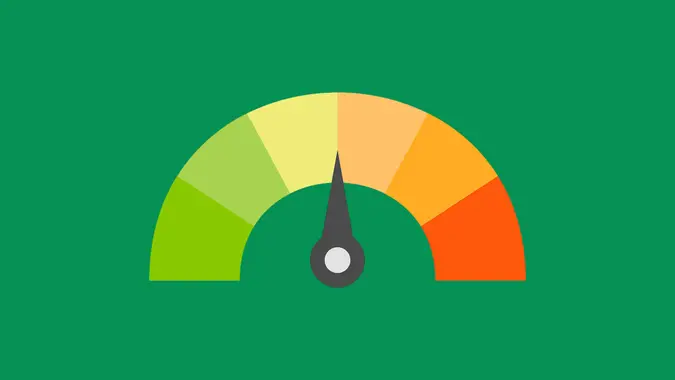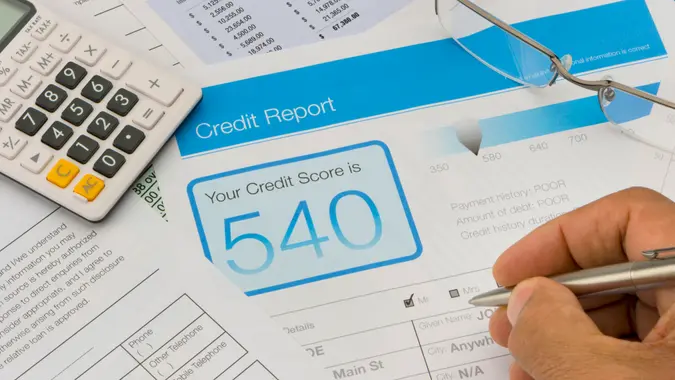What Is the FACT Act?

Commitment to Our Readers
GOBankingRates' editorial team is committed to bringing you unbiased reviews and information. We use data-driven methodologies to evaluate financial products and services - our reviews and ratings are not influenced by advertisers. You can read more about our editorial guidelines and our products and services review methodology.

20 Years
Helping You Live Richer

Reviewed
by Experts

Trusted by
Millions of Readers
The Fair and Accurate Credit Transactions Act, also known as FACTA, gave consumers greater control over their financial data and provided protections against identity theft.
Today, many consumers take its key provisions for granted as basic safeguards for their personal and financial data in the digital age.
It was enacted in 2003 and updated the Fair Credit Reporting Act (FCRA) of 1970.
Why FACTA Matters for Your Financial Health
Before FACTA, many consumers had a difficult time accessing their own credit reports, leaving them uninformed when borrowing money, applying for credit, renting an apartment or conducting any transaction that required a financial background check. Consumers were not entitled to a free copy of their credit report unless they had recently been turned down for credit.
Even then, they had to write to each of the three credit bureaus with a copy of the letter of denial and request a copy of their credit report in writing from each agency. The only other option was to pay to see your credit report.
Getting Your Free Credit Report
The original language of the legislation required the three credit bureaus — Experian, TransUnion and Equifax — to issue a free credit report to any consumer who requested one once in any 12-month period.
However, emergency legislation enacted during the COVID-19 pandemic changed the requirement to entitle consumers to one free credit report every week instead of once per year. According to the Federal Trade Commission, all three bureaus have since agreed to make the new weekly requirement permanent in 2023.
You can access your credit report at:
- Annualcreditreport.com
- Experian
- Equifax
- TransUnion
- Your bank’s or brokerage’s mobile app
- Third-party platforms like Credit Karma
Check your credit report regularly to ensure there are no mistakes or instances of fraud, and sign up for credit alerts to receive notice if anything changes or suspicious activity is detected.
Why FACTA Is Still Relevant Today
- You can view and assess your credit health before applying for loans or credit so you know what lenders will see before they see it.
- You can identify and challenge any mistakes on your report that might be harming your score.
- Financial institutions are obligated to be proactive in protecting your personal and financial data and must take action if your identity is compromised.
- Businesses must handle credit card numbers judiciously, hide full card or account numbers, and properly destroy all documents on which they are written.
Identity Theft After FACTA
FACTA went a long way in protecting and empowering consumers, but, like all legislation, it was not a complete solution. In the wake of FACTA, fraudsters and criminals did what they’ve always done — evolved and adapted to the laws they strived to circumvent.
In 2024, the FTC received more than 2.6 million fraud reports and 1.1 million reports of identity theft with losses totaling $12.5 billion. Investment fraud alone accounted for $5.7 billion.
How To Protect Your Identity and Safeguard Your Data
Your data is legally protected, but millions still fall victim to fraud and identity theft every year. No legislation is foolproof, and fraudsters count on your complacency. To stay safe and protect your data and identity, follow these steps.
- Don’t respond to messages from strangers. Ignore texts, calls, emails and social media messages from numbers, people and businesses you don’t recognize.
- Don’t carry your identifying documents with you. Keep your Social Security card, birth certificate, passport and other identifying documents safe at home.
- Be careful who you share personal information with. Never share Social Security numbers, bank account numbers, birthdays or other identifying information with anyone except when required on official applications.
- Keep up to date on new scams. Learn about ATM skimming and other common scams, and take steps to prevent them.
- Don’t leave mail unattended. Collect your mail daily, and place delivery on hold when you’re away.
- Look for suspicious activity. Review bank and credit card statements as soon as they arrive, keeping an eye out for suspicious or unauthorized transactions, and report any you find immediately.
- Use extra caution with digital banking. Never use unsecured Wi-Fi and learn how to secure your connections.
- Freeze your credit. If you’re not planning for a loan, keep your credit frozen until you are.
- Get fraud alerts. Use free credit monitoring services and sign up for fraud alerts.
FAQ
- What is the FACTA and why was it created?
- FACTA was created to give consumers more control over their credit and personal information. Most famously, it gives consumers the right to get a free credit report every year.
- How does FACTA help protect against identity theft?
- There are several rules that protect consumers against identity theft in FACTA. It allows you to monitor your credit report for potential fraud, it requires financial institutions to securely dispose of your information and it prevents merchants from printing your full credit card number on receipts.
- How do I get my free credit reports under FACTA?
- You may have to create an account, but you can get your free credit report from: AnnualCreditReport.com, Experian, Equifax and TransUnion
- What’s the difference between FACTA and FCRA?
- FCRA was passed in 1970 and includes regulations about your credit, like who can request access for example. FACTA deepened the consumer protections from FCRA.
Jose Vasquez contributed to the reporting of this article.
Our in-house research team and on-site financial experts work together to create content that’s accurate, impartial, and up to date. We fact-check every single statistic, quote and fact using trusted primary resources to make sure the information we provide is correct. You can learn more about GOBankingRates’ processes and standards in our editorial policy.
- FTC "Fair and Accurate Credit Transactions Act of 2003"
- ABA "Fair and Accurate Credit Transactions Act"
- FTC "Fair Credit Reporting Risk-Based Pricing Regulations; Proposed Rule "
- CFPB "Fair Credit Reporting Act"
- SecureScan "FACTA: Understanding The Fair and Accurate Credit Transactions Act"
- FDIC "Fair and Accurate Credit Transactions Act of 2003 Guidelines Requiring the Proper Disposal of Consumer Information"
- FTC "You now have permanent access to free weekly credit reports"
- FTC "New FTC Data Show a Big Jump in Reported Losses to Fraud to $12.5 Billion in 2024"
- USA.gov "Identity Theft"
 Written by
Written by  Edited by
Edited by 






















